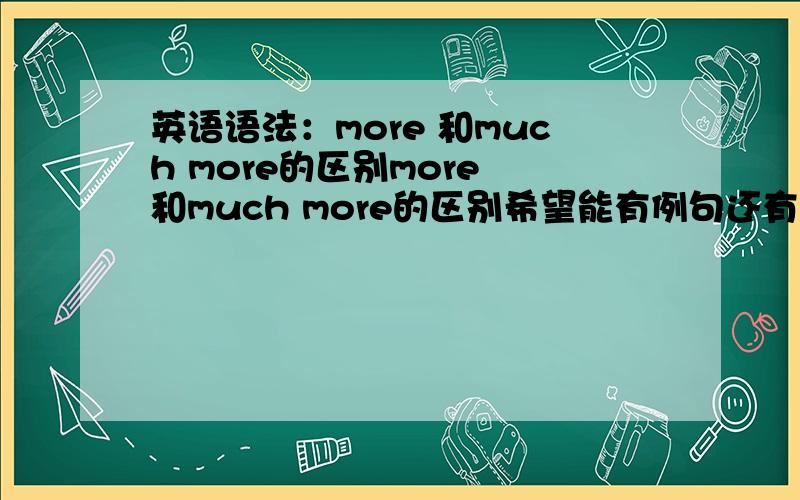英语语法:more 和much more的区别more 和much more的区别希望能有例句还有要 while 和 when 的用法和例句,
来源:学生作业帮助网 编辑:作业帮 时间:2024/11/29 07:03:51

英语语法:more 和much more的区别more 和much more的区别希望能有例句还有要 while 和 when 的用法和例句,
英语语法:more 和much more的区别
more 和much more的区别
希望能有例句
还有要 while 和 when 的用法和例句,
英语语法:more 和much more的区别more 和much more的区别希望能有例句还有要 while 和 when 的用法和例句,
1.more为much和many的形容词比较级,表示更多的,也可以加在多音节词前表示比较级,如more interesting,表示更有趣的.而much more中的much只是一个副词用来加深more的程度而已,如much more interesting就比more interesting的程度更深.
2.while表示“在...期间”,如:While we were talking,he came in.我们正在谈话时,他进来了.
when表示“当...时候”,如:I was walking along with the street when someone called me from behind.我正沿着街道走时,忽然后面有人喊我.注意时态的区别!
when,while 显然都可以引导时间状语从句,但用法区别非常大。
一、when可以和延续性动词连用,也可以和短暂性动词连用;而while只能和延续性动词连用。
① Why do you want a new job when you've got such a good one already?(get为短暂性动词)你已经找到如此好的工作,为何还想再找新的?
②S...
全部展开
when,while 显然都可以引导时间状语从句,但用法区别非常大。
一、when可以和延续性动词连用,也可以和短暂性动词连用;而while只能和延续性动词连用。
① Why do you want a new job when you've got such a good one already?(get为短暂性动词)你已经找到如此好的工作,为何还想再找新的?
②Sorry,I was out when you called me.(call为短暂性动词)对不起,你打电话时我刚好外出了。
③Strike while the iron is hot.(is为延续性动词,表示一种持续的状态)趁热打铁。
二、when从句的谓语动词可以在主句谓语动作之前、之后或同时发生;while从句的谓语动作必须是和主句谓语动作同时发生。
1.从句动作在主句动作前发生,只用 when。
①When he had finished his homework,he took a short rest.(finished先发生)当他完成作业后,他休息了一会儿。
②When I got to the airport,the guests had left.(got to后发生)当我赶到飞机场时,客人们已经离开了。
2.从句动作和主句动作同时发生,且从句动作为延续性动词时,when,while都可使用。
①When /While we were dancing,a stranger came in.(dance为延续性动词)当我们跳舞时,一位陌生人走了进来。
②When /While she was making a phonecall,I was writing a letter.(make为延续性动词)当她在打电话时,我正在写信。
3.在将来时从句中,常用when,且从句须用一般时代替将来时。
①You shall borrow the book when I have finished reading it.在我读完这本书后,你可以借阅。
②When the manager comes here for a visit next week,Ill talk with him about this.下周,经理来这参观时,我会和他谈谈此事。
三、when用于表示“一……就……”的句型中(指过去的事情)。
sb.had hardly(=scarcely) done sth.when...=Hardly / Scarcely had sb.done sth.when...
①I had hardly /scarcely closed my eyes when someone knocked at the door.=Hardly / Scarcely had I closed my eyes when someone knocked at the door.我刚一闭上眼,就有人在敲门了。
②I had hardly /scarcely entered my room when the telephone rang.=Hardly /Scarcely had I entered my room when the telephone rang.我刚一走进房门,电话就响了。
收起
while是时间的一点
when指一段时间
more 更加:更 比较级 常修饰三音节或以上的adj more beautiful: more cool
much more 多得多 词组 eg:It gives you a lot of expressive convenience, you can write the programs much more cleanly,...
全部展开
while是时间的一点
when指一段时间
more 更加:更 比较级 常修饰三音节或以上的adj more beautiful: more cool
much more 多得多 词组 eg:It gives you a lot of expressive convenience, you can write the programs much more cleanly, but most importantly,it's fast.
你可以把一些程序写的更清楚,最重要的是,它的效率非常高。
收起
两者之间强调的程度不同的
much 是用来修饰more的 比单独一个more程度要深一些
简单一点来说吧,more修饰比较级,much修饰more